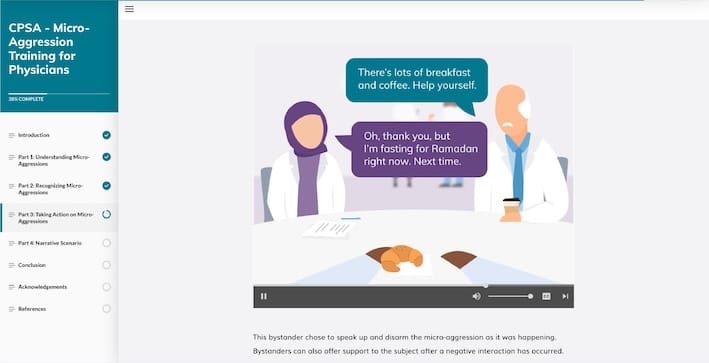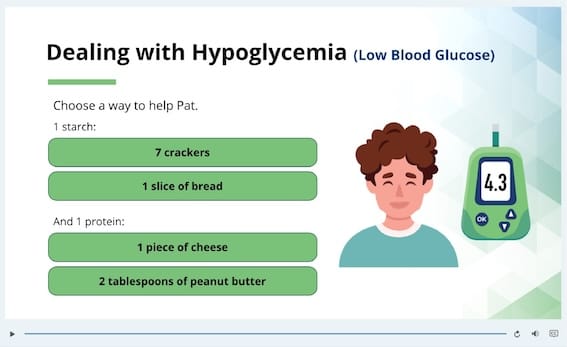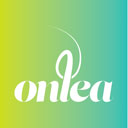Education is a vital part of the healthcare ecosystem, empowering professionals and shaping improved patient outcomes. ELearning has emerged not just as an alternative to traditional classrooms but as an essential modality in the future of healthcare education. As eLearning enthusiasts and professionals, we've had the pleasure of seeing the impact of online training in the healthcare sector in Canada firsthand.
It’s not just about a tech trend; it’s about recognizing the evolving needs of healthcare professionals, regulatory bodies, and patients. In a sector where continuous learning correlates to improved standards of care and patient outcomes, eLearning is an investment in the most valuable currency available—knowledge.
In this Onlea blog post, we'll explore why eLearning is emerging as the future of healthcare education and training. We’ll also showcase some real examples of online healthcare courses we’ve produced for our clients to show you what eLearning can do for you.
Unpacking the Benefits of eLearning for Healthcare Training
Let’s look at some of the key benefits eLearning brings to the table in healthcare:
- Flexible access to learning. ELearning offers unparalleled flexibility with round-the-clock availability to professionals and patients.
- Better learning outcomes. Interactive and multimedia content enhances engagement. Self-paced learning allows for better learning retention, especially for complex subjects.
- Accessibility. Online training eliminates the limitations of geographical barriers, making quality training accessible to professionals and patients in remote or underserved areas. Our eLearning is designed to be inclusive for learners with disabilities, promoting equity in access for all patients.
- Engagement. ELearning engages learners actively with interactive elements like quizzes, simulations, scenarios, and gamification.
- Cost-Saving. Elearning reduces or eliminates the need for physical materials, travel, and accommodation, making it a more budget-friendly scaling option. This allows healthcare organizations to extend high-quality training to more learners without significant budget increases.
Are you looking to leverage these benefits in your healthcare training programs? Contact us to find out how our tailored eLearning solutions can meet your educational needs and goals.
Real Use Cases of eLearning in Healthcare
In this section, we’ll take you through some highlights from our portfolio in healthcare as inspiration for how you could use eLearning in your organization.
Board and administration training and education
Standards of care start from the top, and eLearning is a valuable yet under-utilized tool to improve leadership in healthcare organizations. The Effective Governance for Quality and Patient Safety Program we created for Healthcare Excellence Canada goes beyond traditional education by offering adaptable, accessible, and focused learning experiences for healthcare boards—crucial for driving improvements in quality and patient safety.
A key strength of this eLearning initiative is its collaborative delivery model, offered in partnership with health regions across Canada. The ability to tailor educational sessions to local circumstances enhances the relevance and applicability of the learning.
Practice standards education for physicians and surgeons
Maintaining competency and continuing education is a part of any physician’s ongoing duties. The Practice Standards series is a set of three online courses on the standards of professional, ethical, and legal practice and care mandated by The College of Physicians and Surgeons of British Columbia.
The College offers Leaving Practice, Ending the Patient-registrant Relationship, and Virtual Care for free to all College registrants through their online learning platform.
What makes these courses exceptionally effective is how they cater to the needs of busy medical professionals. Physicians can update their knowledge of practice standards in only 15-20 minutes at their convenience on any computer or mobile device.
Microlearning—bite-sized, compact lessons—proves to be an important strategy to engage busy medical professionals with effective learning outcomes, ensuring quality patient care.
Scenario-based professional skills and training
The College of Physicians and Surgeons of Alberta used eLearning to take a proactive approach to a complex and often overlooked issue in healthcare—racism and discrimination. Micro-aggression Training for Physicians provides comprehensive education on addressing micro-aggressions in healthcare settings.
Modules include scenarios that simulate real-life situations, so physicians can learn about the theory and practice new skills relating to everyday clinical interactions. Scenario-based courses pose an effective and accessible alternative to in-person workshops, where participants can actively apply and practice knowledge independently and without geographic requirements.

The College of Physicians and Surgeons of Alberta offers Micro-aggression Training for Physicians for free to College registrants.
Delivering accessible patient education
ELearning isn’t just for healthcare professionals either; it’s making a real difference in patients' lives and managing their daily health and wellness.
The Sherwood Park Primary Care Network uses a hybrid of online and in-person learning to meet diverse patient needs while expanding the capacity of busy clinician educators. Online classes offer more accessibility for patients with busy schedules, transportation barriers, and safety concerns.

Currently, they offer a series of award-winning classes for their patients at no cost, ranging from self-paced modules to virtual group therapy classes. We helped SPPCN by making recommendations for the technology and set-up required for hybrid instruction, rebuilding PowerPoint slide decks, training their clinicians in best practices for synchronous instruction, and building new asynchronous micromodules.
To sum up, the transition to eLearning in healthcare is a significant move towards more effective, accessible and engaging training methods. From practitioners enhancing their medical knowledge to patients gaining a better understanding of their health, eLearning is proving to be a valuable asset in healthcare education.
Are you inspired by these innovative approaches to education in healthcare? Do you see a need for similar training in your organization?
Reach out to us to explore how our eLearning solutions can assist in developing comprehensive and engaging training programs on crucial healthcare topics.
